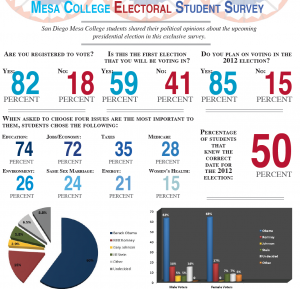On Tuesday, Nov. 6, citizens across the United States will file down to their local schools, churches and community centers to participate in the democratic tradition that America was built upon: election day.
Many San Diego Mesa College students are studying up on the presidential candidates and the issues that matter most to them. In an anonymous survey of 68 students conducted at Mesa College, 86.1 percent of students polled have already made their decision on the candidate that they will be casting their vote for, while 8.8 percent remain undecided.
A 20-year-old, male physics major will base his final decision on “the degree of consistency” and “the final, most recent plans that they would enact [as] president.”
Other students have firmer decisions on who they plan on voting for.
“If Romney wins, I’m moving to Canada,” said one Barack Obama supporter, a female, 19-year-old student who has yet to declare a major.
Third party candidates were also represented in the poll, with Libertarian party candidate Gary Johnson pulling in 2.9 percent and Green party candidate pulling in 5.8 percent.
“Hopefully third parties get to have more influence from now on,” said a male social sciences major (age 20) who plans on voting for Stein.
About 5.1 percent of students surveyed plan on abstaining from voting this election season.
“We need to start a revolution before this country falls or takes away all of our rights,” said a 19-year-old, male accounting major who will not be participating in the election.
Barack Obama
Joe Biden
Democratic Party
Education: To increase access to a college education, Obama is aiming to decrease rises in tuition costs by half. Another one of his goals is to use tax credits and student loan reform to increase the number of Americans that graduate from college. In his first term, Obama limited federal student loan repayments to 20 percent of thei student’s income.
Jobs/Economy: After 31 months of job growth Obama plans to encourage further domestic job growth by removing tax breaks for American companies that outsource jobs to other countries. To increase sustainable job growth, he is encouraging an extension of clean energy tax credits in Congress. Obama would also make middle class tax cuts a permanent fixture.
Taxes: If reelected, Obama would continue to sign small business tax cuts into law. He would also end the war in Afghanistan so that tax revenue can be used to improve U.S. infrastructure, energy, technology and education.
Source: www.barackobama.com
Mitt Romney
Paul Ryan
Republican Party
Education: With the intention of “promoting choice and innovation,” Romney would allow Individuals with Disabilities Education Act funds to be interchangeable so that sttudents can choose the schools that attend. He would also make changes No Child Left Behind to increase access to information about school quality and performance for parents.
Jobs/Economy: Changes to the members of the National Labor Relations Board would be made under Romney, and an amendment would be made to the National Labor Relations Act that would give greater control to business owners in terms of how they spend their revenue.
Taxes: Romney’s tax plan would involve a 20 percent cut on individual tax rates and a repeal of estate taxes on inherited property. If elected, he would also cut corporate tax rates from 35 percent to 25 percent. He would decrease government spending and believes that these changes would foster economic stability.
Source: www.mittromney.com
Jill Stein
Cheri Honkala
Green Party
Education: Stein’s main educational goal is to avoid the privatization of American schools by creating a tuition-free school system from kingergarten until college. She would also wipe the slate on all current student debt, as well as focusing more tax revenue on schools and libraries.
Jobs/Economy: If elected, Stein and Honkala would enact a “Full Employment Program,” which would create 25 million jobs in the fields of public transit, sustainable energy, organic agriculture and clean manufacturing. In addition, their program would also create more jobs in the fields of social work and education.
Taxes: Military budgets would be decreased under a Stein presidency, while cuts to Social Security and Medicare would cease. A 90 percent tax would be implemented on any bankers that received bonuses after their companies were bailed out. In an attempt to decrease the deficit, she would reduce tax credits that she feels are “needless.”
Source: www.jillstein.org
Gary Johnson
James Gray
Libertarian Party
Education: The Department of Education would be ended if Johnson were elected as president to decrease government spending while increasing state control over education. He would reduce education to a state-funded entity by either completely removing or simply decreasing federal funding to public and charter schools.
Jobs/Economy: Johnson believes that a three part plan through spending cuts, tax cuts and the minimization of the government in economic affairs is the key to economic recovery. Major cuts to energy, housing and transportation would occur in his attempt to stimulate the economy. His program would also include reform to Social Security, Medicare and Medicaid to prevent further debt increases.
Taxes: Under a Johnson presidency, the Internal Revenue Service would be eliminated and taxes would be imposed on purchases instead of income, though items needed for basic survival would carry no tax.
Source: www.garyjohnson2012.com

